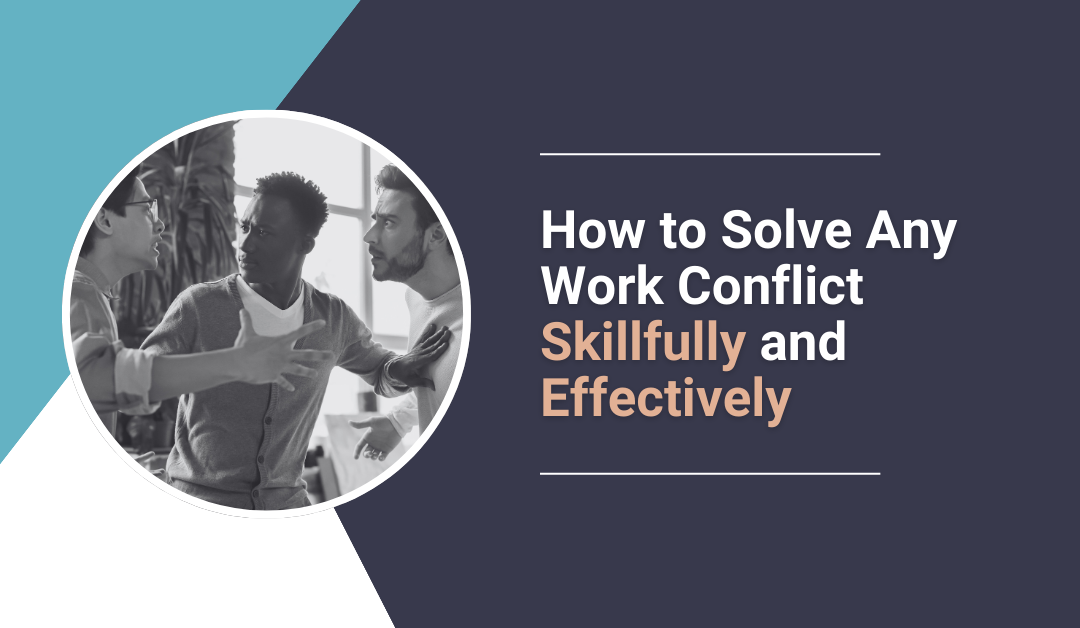Having good relationships at work matters to you, but you are experiencing conflict with a person on your team. It’s driving you crazy, the moment you jump on a zoom meeting, and that person is on, you immediately feel resistance, even repulsion. You even feel like you don’t want to be on that call. And work has become far less enjoyable for you.
The impact isn’t just on yourself: as a result of this ongoing conflict, your entire team isn’t as productive as it could be, which adds to your stress – as you have tight deadlines and many tasks you already feel behind on. This situation also gets in the way of evolving projects and products in an effective, collaborative way. It is almost impossible to have the conversations required for good ideas to become great ideas because people are holding back, not having the authentic conversations and taking the risks necessary to iterate an idea or product.
To quote the CEO and keynote speaker Margaret Heffernan:
“For good ideas and true innovation, you need human interaction, conflict, argument, debate.”
To sum it up, you feel like you are not doing great work. Unfortunately, conflict doesn’t just stop innovation, it can also affect culture, or more so, it can even define culture.
Culture doesn’t get built by putting values up on walls, by how senior leaders define it, or by the things an outsider can see, such as furniture and office layout, dress norms, inside jokes, and mantra. Culture is being built by the norms you set when you go through difficult situations.
How you acted when things were difficult is what people remember. Scientifically speaking, memories are seared into the brain when more cortisol is present during times of high pressure and conflict. This is what then becomes your team’s and organization’s culture.
How can I get better at dealing with conflict?
If you want to get better at dealing with conflict, if you want to build a great team, improve your reputation and advance your career, the most important thing you need to build are skills to be better in times of pressure and conflict. Here are three ideas to help you:
1. When you face conflict, be honest with yourself about:
- How are you dealing with it?
- How do you show up when you are being criticized? Do you shut down or stay open?
- What do you do when you want to say something, but know it will upset another person? Do you face it head on, or do you avoid it because of the potential consequences?
- What norms are you setting, and what culture are you building for your team or organization because of how you manage difficult situations?
Self-awareness is the critical skill you need when you are in a Last 8% and, ironically, the first thing that you lose in times of conflict and pressure, causing you to be less skilful than you want to be.
2. Because you lose self-awareness at exactly the moment it’s needed the most, you are not very effective at conflict.
In fact, most people aren’t. Part of the reason is what your brain was designed for: quickly assessing a situation and deciding whether you are at risk or not. It prioritizes speed over accuracy. For that reason it is very easy for you to misunderstand other people when you are under pressure. You can miss the fact that, in the middle of a Last 8% conversation, there are three things going on:
- what the other person says,
- what they mean, and
- what you hear.
The pressure you experience during a Last 8% moment can cause you to misjudge what is being said and what is meant, causing you to misunderstand intentions.
Key Take-away:
Next time you are in high-pressure conversation with more on the line, keep this in mind and try listening on these different levels. You will be surprised how powerful it is for your understanding of the situation and how it helps you know what next step to take.
3. Finally, know that you are at high risk to take things personally.
People tend to not do things to you, they do them for their own reasons. Most of what drives another person’s negative behavior is not necessarily you, it is the fact that they have an emotional need that is not being met: such as not feeling safe, respected, included or valued, or not having autonomy.
So stop personalizing the situation and instead try to speculate and – if you can find the courage – even check-in in with them about what is going on for them. Are they are feeling included, valued, or that they are having autonomy?
Who Do You Want To Be?
The good news is that the skills for being great in any conflict can be learned.
Even better: once you acquire them you can enter the Last 8% zone more frequently and confidently and out of that, transform any more challenging relationship. Most people avoid the Last 8%, end up with fractured relationships and feeling bad about not facing the situation head on – this is characteristic of a Family culture. This doesn’t have to be the way you and your team operate. By learning some key skills around managing your emotions, you will be far more in control of your life and relationships than you have ever been before. On top of that, you end up being that person everyone in your office looks up to, because you are the one who has the courage to do what’s challenging.
“Do one thing every day that scares you.”
~ Eleanor Roosevelt
Learn how IHHP’s Emotional Intelligence solutions can help equip your team to skillfully handle conflict here.

